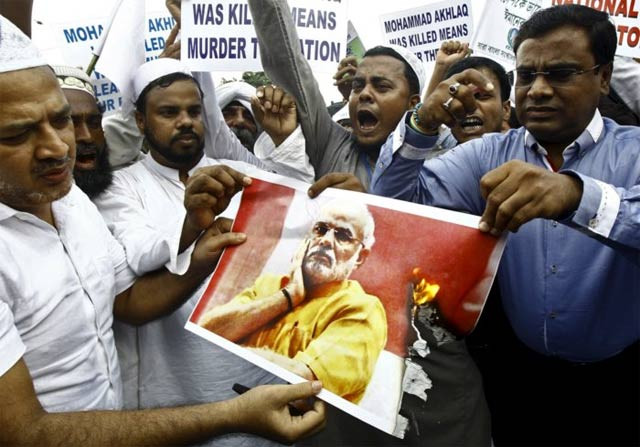India’s crisis of secularism
The fact remains that Gandhi himself wove Hinduism into the freedom movement to broaden its appeal to the masses

The fact remains that Gandhi himself wove Hinduism into the freedom movement to broaden its appeal to the masses. PHOTO: REUTERS
It is unfortunate to note the unravelling of secularism in India these days. While India may still be called the world’s biggest secular democracy, the underlying tensions between state, society, and religion within the country make it hard to accept the authenticity of such a label. Besides the prejudice and violence directed against Muslims, India’s minority religious groups more generally find themselves to be in an increasingly precarious situation, given the affiliation of mainstream political parties, particularly the BJP, with fundamentalist religious elements.
Although the Indian National Congress, managed from the 1930s on to build a mass anticolonial movement, it never quite succeeded in bridging all the major divisions in Indian society. Gandhi himself was killed by a Hindu fundamentalist, who thought him to be too soft on the Muslim issue. Yet, the fact remains that Gandhi himself wove Hinduism into the freedom movement to broaden its appeal to the masses. Gandhi’s intertwining of religious motivation into the anti-colonial movement, however, exacerbated alienation of Muslims and gave impetus to the two-nation theory.
‘Secular exercise’: Indian court says faith has no role in election
Another Congress stalwart, Sardar Patel, and his communal tendencies, also remain the subject of much debate. Although secular, the Nehru dynasty, especially the authoritarian reign of Indira Gandhi, and her suppression of the Khalistan movement, further enabled political ambitions to be defined along increasingly divisive lines.
While Gandhi, Nehru or Patel would undoubtedly chide the prevalent communal trajectory in India, the fact remains that communalism was also a problem during their times.
Communalist chauvinism, however, went into hyperdrive 25 years ago, when the Babri Mosque demolition took place. Since then, Hindu nationalism has been growing and the 2002 Gujrat massacre under Modi, and its political aftermath, raise serious questions about the Indian state’s commitment to secularism.
The BJP-led coalition government of A B Vajpayee refused to suspend or criticise Modi, and instead permitted him to campaign for fresh elections in his home state and beyond. The BJP under Modi has continued to use the communal card to gain leverage. The recent elections in Uttar Pradesh have resulted in a firebrand Hindutva leader becoming the CM. In a state with nearly 40 million Muslims, the BJP did not even field a single candidate from the minority community in the election.
The election of the new Indian president is also not encouraging in terms of India’s aspirations to be a secular democracy. While Indian lawmakers may have voted in a new president from the bottom of the Hindu caste system, he is not very tolerant or sympathetic when it comes to Christians and Muslims. Modi, however, has been keen to woo Dalit support, to secure another win for the BJP in the 2019 general election, since his party has largely alienated Indian Muslims.
Modi urges India to reject violence in name of religion
In the world of realpolitik, these alarming developments are not getting the attention that they need. There was a time that Modi and his role in the Gujrat massacre had made him an international persona non grata. Once banned from the US, Modi subsequently managed to develop very warm relations with the US under President Obama. Given its keenness to use India as a counterbalance to China, the current US administration is also not very concerned that Indian democracy has become hostage to those who wish to impose upon it a narrow-minded, divisive and communal vision.
To reassert, and to further evolve its secular identity, the world at large, including Indians, must not over-estimate their democratic credentials.
Published in The Express Tribune, August 25th, 2017.
Like Opinion & Editorial on Facebook, follow @ETOpEd on Twitter to receive all updates on all our daily pieces.
















COMMENTS
Comments are moderated and generally will be posted if they are on-topic and not abusive.
For more information, please see our Comments FAQ